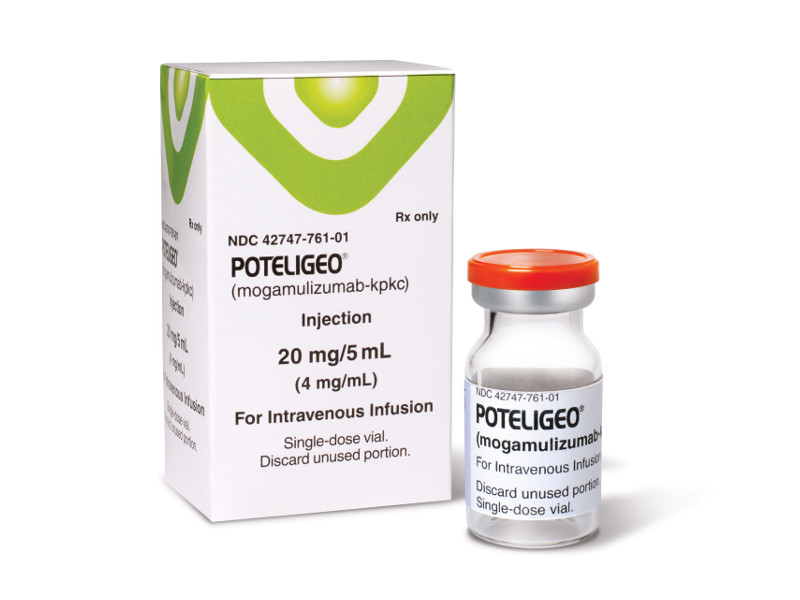Poteligeo (mogamulizumab) vs Columvi (glofitamab-gxbm)
Poteligeo (mogamulizumab) vs Columvi (glofitamab-gxbm)
Poteligeo (mogamulizumab) is a monoclonal antibody used for the treatment of certain types of cutaneous T-cell lymphoma (CTCL), specifically targeting the C-C chemokine receptor type 4 (CCR4) on the surface of cancer cells. In contrast, Glofitamab (not Columvi, as it may be a typographical error) is a bispecific monoclonal antibody designed for the treatment of B-cell non-Hodgkin lymphoma, which recruits T-cells to attack CD20-positive B-cells. When deciding between these two medications, it is crucial to consider the specific type of lymphoma being treated, as Poteligeo is indicated for CTCL, a type of T-cell lymphoma, while Glofitamab targets B-cell lymphomas, and their use would depend on the lymphoma subtype diagnosed by a healthcare provider.
Difference between Poteligeo and Columvi
| Metric | Poteligeo (mogamulizumab) | Columvi (glofitamab-gxbm) |
|---|---|---|
| Generic name | mogamulizumab-kpkc | glofitamab-gxbm |
| Indications | Relapsed or refractory mycosis fungoides or Sézary syndrome in adults | Currently under investigation for B-cell non-Hodgkin lymphoma |
| Mechanism of action | CCR4-directed monoclonal antibody | Bispecific monoclonal antibody targeting CD20 on B-cells and CD3 on T-cells |
| Brand names | Poteligeo | Columvi |
| Administrative route | IV infusion | IV infusion |
| Side effects | Rash, infusion reactions, fatigue, diarrhea, musculoskeletal pain | Currently under investigation; specific side effects not yet fully characterized |
| Contraindications | Hypersensitivity to mogamulizumab or any of its excipients | Not yet fully established |
| Drug class | Monoclonal antibody | Bispecific monoclonal antibody |
| Manufacturer | Kyowa Kirin | Genentech, a member of the Roche Group |
Efficacy
Poteligeo (Mogamulizumab) Efficacy in Treating Lymphoma
Poteligeo, also known by its generic name mogamulizumab, is a monoclonal antibody used in the treatment of certain types of lymphoma, specifically adult patients with relapsed or refractory mycosis fungoides (MF) or Sézary syndrome (SS) after at least one prior systemic therapy. These conditions are types of cutaneous T-cell lymphomas (CTCL), which are rare cancers that begin in the white blood cells and affect the skin. The efficacy of Poteligeo was demonstrated in a pivotal clinical trial that compared it to vorinostat in patients with relapsed or refractory MF or SS. The results showed a significant improvement in progression-free survival (PFS) for patients treated with mogamulizumab compared to those who received vorinostat.
The study indicated that mogamulizumab has a higher response rate and a longer duration of response compared to other previously administered therapies for CTCL. As a targeted therapy, it works by binding to the C-C chemokine receptor type 4 (CCR4) expressed on the surface of some cancer cells, enhancing the immune system's ability to detect and destroy these cells. The improved outcomes in terms of PFS and overall response rate suggest that Poteligeo is a valuable treatment option for patients with MF and SS who have limited responses to traditional therapies.
Columvi (Glofitamab-gxbm) Efficacy in Treating Lymphoma
Columvi, with the generic name glofitamab-gxbm, is an investigational bispecific monoclonal antibody designed for the treatment of B-cell non-Hodgkin lymphoma (NHL). While it is not yet approved, early clinical trials have shown promising results in patients with relapsed or refractory NHL, including diffuse large B-cell lymphoma (DLBCL). Glofitamab-gxbm works by simultaneously binding to CD20 on B-cells and CD3 on T-cells, thereby bringing the T-cells into close proximity with the cancerous B-cells, which may enhance the body's immune response against the tumor cells.
In early clinical studies, glofitamab-gxbm has exhibited substantial antitumor activity, with a number of patients achieving complete responses, even in cases where the disease is highly refractory to existing treatments. The efficacy data from these studies suggest that Columvi could represent a significant advancement in the treatment of B-cell NHL, offering hope to patients who have exhausted other therapeutic options. However, further studies are needed to confirm these findings and to establish the safety and efficacy profile of glofitamab-gxbm for regulatory approval and widespread clinical use.
Regulatory Agency Approvals
Poteligeo
-
European Medical Agency (EMA), European Union

-
Food and Drug Administration (FDA), USA

-
Therapeutic Goods Administration (TGA), Australia

Columvi
-
European Medical Agency (EMA), European Union

-
Food and Drug Administration (FDA), USA

Access Poteligeo or Columvi today
If Poteligeo or Columvi are not approved or available in your country (e.g. due to supply issues), you can access them via Everyone.org.
How it works

Make an enquiry
Choose the medicine you want to buy, answer a couple of questions, and upload your prescription to speed things up. We’ll get back to you within 24 hours.


Make an enquiry
Choose the medicine you want to buy, answer a couple of questions, and upload your prescription to speed things up. We’ll get back to you within 24 hours.


Breeze through the paperwork
We'll guide you through the required documents for importing unapproved medicine, ensuring you have all the necessary information.


Get a personalized quote
We’ll prepare a quote for you, including medicine costs and any shipping, administrative, or import fees that may apply.


Receive your medicine
Accept the quote and we’ll handle the rest - sourcing and safely delivering your medicine.

Some text on this page has been automatically generated. Speak to your physician before you start a new treatment or medication.
Let's talk
If you have any questions, call us or send us a message through WhatsApp or email:
Contact us




